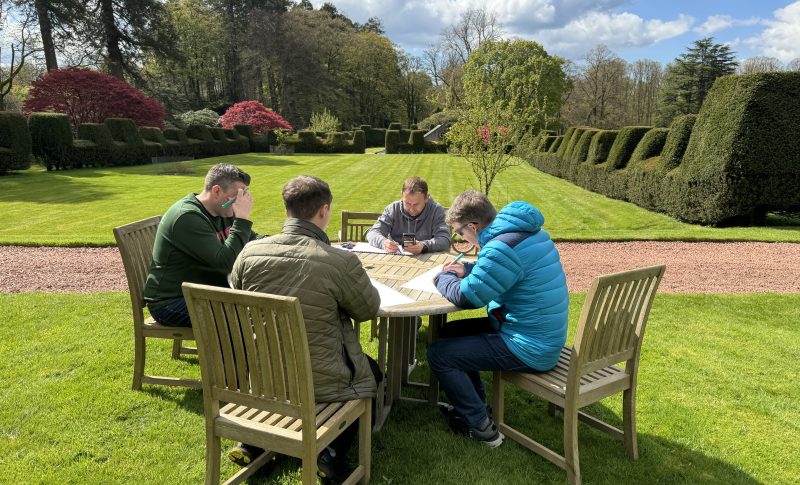Slow down and wise up. 3 reasons why deceleration is key to smart leadership and how to do it.
But slowing down and taking stock can help your business stay relevant and reap great rewards.
By decelerating we mean creating the time and space for business leaders to stop and think. It is about time out of the business to work on the business. It is about getting heads out of the operational noise and thinking strategically. It’s about building resilience, reflecting and re-energising.
Smart leaders know that quality thinking is crucial, and while stepping off the operational hamster wheel might feel counterintuitive, the value of doing it is huge.
And if you feel you’re too busy and overstretched to contemplate pausing and lifting your gaze for even half a day, then perhaps you have stopped being a leader and are in perpetual operational management mode.
Think about that! A business with failing leadership…
Here are 3 reasons why deceleration makes great business sense.
#1 Living at speed is unsustainable
Busyness is seductive. But it isn’t really good business. Activity isn’t the same as achievement. And a continuous focus on operations, fighting fires, tackling problems, and never getting on top of things is a sure-fire energy sapping route to melt-down. It’s not clever and it’s not healthy for anyone.
Why is this good business sense?
You are going to kill or lose people. These are costly and avoidable business risks.
Slow down, wise up.
#2 Slowing down enables high quality strategic thinking
Deceleration isn’t about slowing down the delivery of business-as-usual, it is about creating a space where leaders can lift their gaze and start to explore the big possibilities that lie beyond immediate operational problems, and to shape the steps that will turn these into high value successes.
It’s about quality thinking: about direction and priorities; about building capability; about being resilient; and above all, about remaining relevant and in business This is absolutely key, and can’t be adequately explored while head-down, arse-up fighting operational fires.
Why is this good business sense?
Better thinking, better conversations, better decisions, and better execution around bold strategic goals will accelerate achievement of success – however you define this for your business.
Put another way, crap thinking will lead to crap everything else you hold dear – revenue, profitability, cost avoidance, environmental impact, health, happiness etc..
# 3 It’s a powerful way to deal with the really hard soft team performance stuff!
Self-awareness, trust, fear and mindset are issues that many leaders and their teams wrestle with, and fail to front up to. These are the building blocks of team and organisational performance.
Slowing down and tackling these issues takes guts and a well thought out approach. An inspiring offsite space supported by experienced coach-facilitators will open up new levels of collaboration and clarity of purpose for you. Go for a walk, undertake a joint activity, strip away the work masks and connect.
Why is this good business sense?
When you get to know one another at a more human and honest level you’ll be amazed how trust and the quality of conversation blossoms. Ultimately the quality of collective decision-making improves.
Or you can continue to limp along as a dysfunctional operationally focused team that is too unaware or scared to make the investment in dealing with a wholly avoidable situation.
How to decelerate
None of this is rocket science. The difficult bit is actually following through on a decision to do it, and doing it on a drumbeat that matches your business cycle, or on an as required basis in between times.
- Schedule your decelerator events. Be brave and take 3 days and 2 nights. Maybe once a quarter, whatever the right drumbeat is for your business.
- Craft a programme around a theme, an inquiry, not an agenda. You want to encourage divergent thinking and creative conversations. That said, the back end of your time together could/should be more convergent around decisions and commitments to action.
- Go offsite. Go somewhere inspiring. Not the same old hotel conference room.
- Hire really good coach-facilitators. This is a key investment. They will challenge and support you as well as handle all the logistics and activities. They will co-design the event with you, and help you achieve your goals. They will give you the space to be fully present with your colleagues. And they will hold you to account in the weeks that follow your decelerator.
- Do stuff together. Don’t sit on your backsides around a table. And don’t just get pissed at the bar. Mix it up. Do stuff together that brings you all alive and takes your heads, hearts, and souls to a bigger bolder place. You want everyone to bring their whole selves to this. Your coach-facilitators will give you some brilliant ideas.
- Be inclusive. The last thing anyone needs is for a heroic sporting boss to impose his/her favourite challenge activity on a terrified, divided and disengaged team. Not smart.
Now that you are up for slowing down, have a look at one of our other blogs on how you might go about designing an offsite decelerator for your team:
We would love to support you in some way, so get in touch now by calling me on +44 7776 153428 or emailing me at dave@freshairleadership.com
Dave Stewart
Managing Director
The Fresh Air Leadership Company



